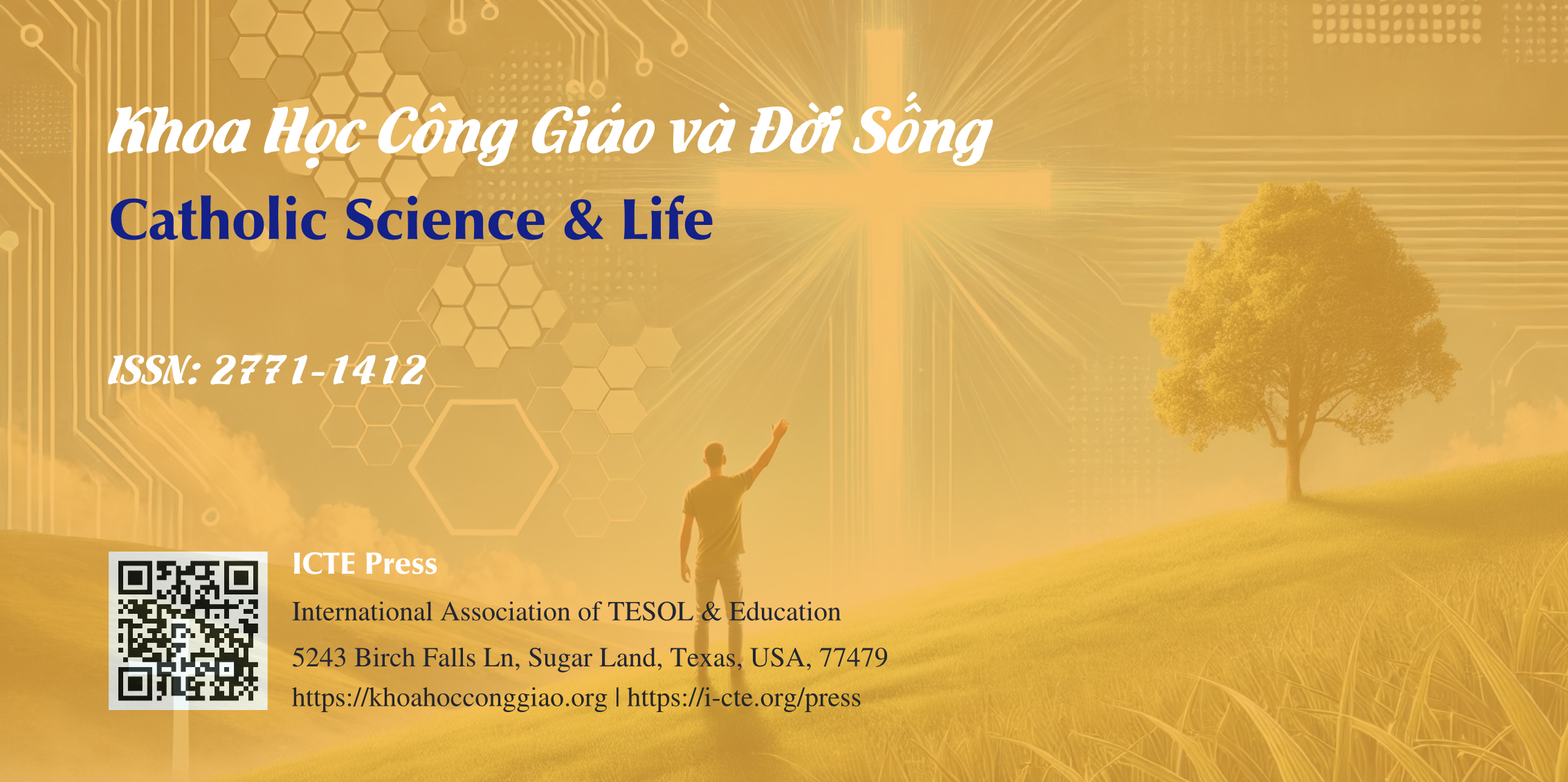Trí Tuệ Nhân Tạo (AI) Và Đời Sống Kitô Hữu: Suy Tư Về Một Lối Tiếp Cận AI Trong Viễn Quan Đạo Đức Và Tâm Linh Kitô Giáo
Artificial Intelligence (AI) and Christian Life: Reflections on an Approach to AI from the Perspective of Christian Ethics and Spirituality
DOI:
https://doi.org/10.54855/csl.25538Từ khóa:
Trí tuệ nhân tạo; Đức tin Kitô giáo; Phẩm giá con người; Đạo đức; Tự doTóm tắt
Bài viết này suy tư về trí tuệ nhân tạo (AI) trong viễn quan đạo đức và tâm linh Kitô giáo, đặt ra những cơ hội và thách đố mà AI mang lại cho con người và Giáo hội. Tác giả trước hết tóm lược những nghi ngại liên quan đến phẩm giá con người, quyền tự do, công bằng xã hội và môi trường sinh thái trong bối cảnh phát triển AI. Tiếp đó, bài viết đọc lại giáo huấn Công giáo về mối tương quan giữa đức tin và khoa học, đặc biệt là những định hướng của Đức Thánh Cha Phanxicô về phát triển AI trong sự tôn trọng phẩm giá con người, đối thoại giữa khoa học và tôn giáo, cũng như trách nhiệm và công ích. Cuối cùng, bài viết gợi ra một lối tiếp cận AI cho Kitô hữu hôm nay: ý thức về phẩm giá độc nhất của con người, huấn luyện lương tâm, và sống tự do đích thực theo Tin Mừng, để biến AI thành công cụ phục vụ phát triển toàn diện và hiệp thông nhân loại.
Abstract
This paper reflects on artificial intelligence (AI) within the perspective of Christian ethics and spirituality, addressing both the opportunities and challenges AI poses for humanity and the Church. The author first outlines concerns related to human dignity, freedom, social justice, and ecological sustainability in the age of AI. He then revisits Catholic teaching on the relationship between faith and science, with particular attention to Pope Francis’ guidelines on developing AI with respect for human dignity, fostering dialogue between science and religion, and ensuring responsibility and the common good. Finally, the article proposes an approach to AI for today’s Christians: cultivating awareness of the unique dignity of the human person, forming conscience, and living authentic freedom in light of the Gospel. This perspective emphasizes that AI must remain a tool at the service of integral human development and universal communion, rather than a threat to human identity and values.
Tài liệu tham khảo
CNN Bussiness, “Pope Francis warns about AI’s dangers”, edition.cnn.com (9/8/2023), trong https://edition.cnn.com/2023/08/09/tech/pope-francis-ai/index.html.
ĐTC Phanxicô, Sứ điệp Hòa bình 2024, s. 2.
ĐTC Phanxicô, Sứ điệp Hòa bình 2024, s. 1.
ĐTC Phanxicô, Laudato sì, s. 54.
ĐTC Phanxicô, Sứ điệp Ngày Thế giới Hòa bình lần thứ 57, 1/1/ 2024, s. 2.
ĐTC Giaon Phaolô Ii, Thông điệp Đức Tin và Lý Trí.
ĐTC Phanxicô, Sứ điệp Ngày Thế giới Hòa bình lần thứ 57, 1/1/ 2024, s. 6.
Danae Kyriakopoulou, “What opportunities and risks does AI present for climate action?”, LSE [The London School of Economics and Political Science] (4/7/2023), trong https://www.lse.ac.uk/granthaminstitute/explainers/what-opportunities-and-risks-does-ai-present-for-climate-action/.
Eliza Chasan, “Some experts see AI as a tool against climate change. Others say its own carbon footprint could be a problem”, CBS News (26/8/2023), trong https://www.cbsnews.com/news/artificial-intelligence-carbon-footprint-climate-change/.
Future of Life Institute, “Pause Giant AI Experiments: An Open Letter”, futureoflife.org (22/3/2023), trong https://futureoflife.org/open-letter/pause-giant-ai-experiments/
Janna Anderson, Lee Rainie, “Artificial Intelligence and the Future of Humans”, Pew Research Center (10/12/2018), trong https://www.pewresearch.org/internet/2018/12/10/artificial-intelligence-and-the-future-of-humans/.
Mike Thomas, “12 Risks and Dangers of Artificial Intelligence (AI)”, Built in (31/10/2023), trong https://builtin.com/artificial-intelligence/risks-of-artificial-intelligence; x. Vnexpress, “Musk: AI sẽ tạo ra thế giới không có việc làm”, trong https://vnexpress.net/musk-ai-se-tao-ra-the-gioi-khong-co-viec-lam-4672818.html.
Vatican News, “Pope’s November prayer intention: that progress in robotics and AI ‘be human’”, vaticannews.va (5/11/2020), trong https://www.vaticannews.va/en/pope/news/2020-11/pope-francis-november-prayer-intention-robotics-ai-human.html.
Vatican News, “Pope: Church’s social teaching can help AI serve the common good”, vaticannews.va (28/2/2020), trong https://www.vaticannews.va/en/pope/news/2020-02/pope-francis-artificial-intelligence-algor-ethics.html.
Vatican News, “Pope at Angelus: Faith and daily life are intimately connected”, vaticannews.va (22/10/2023), trong https://www.vaticannews.va/en/pope/news/2023-10/pope-angelus-faith-has-important-role-in-daily-life.html
Vatican News, “To the Participants in the Seminar ‘The Common Good in the Digital Age’, Organized by the Dicastery for Promoting integral Human Development and the Pontifical Council for Culture” (27/9/2019), vaticannews.va, trong https://www.vatican.va/content/francesco/en/speeches/2019/september/documents/papa-francesco_20190927_eradigitale.html.
Vnexpress, “Giáo sư AI: ‘Dại dột khi coi ChatGPT là bạn tâm giao’”, vnexpress.net (27/12/2023), trong https://vnexpress.net/giao-su-ai-dai-dot-khi-coi-chatgpt-la-ban-tam-giao-4693806.html.
Vnexpress, “Hạ viện Mỹ lo đối phó nguy cơ thảm khốc từ AI”, vnexpress.net (20/2/2024), trong https://thanhnien.vn/ha-vien-my-lo-doi-pho-nguy-co-tham-khoc-tu-ai-18524022021392846.htm.
Vnexpress, “Sam Altman nói AI 'hơi đáng sợ' vì phát triển quá nhanh”, vnexpress.net (3/1/2024), trong https://vnexpress.net/sam-altman-noi-ai-hoi-dang-so-vi-phat-trien-qua-nhanh-4699904.html;
Vnexpress, “Musk: AI sẽ tạo ra thế giới không có việc làm”, vnexpress.net (4/11/2023), trong https://vnexpress.net/musk-ai-se-tao-ra-the-gioi-khong-co-viec-lam-4672818.html.
Tải xuống
Đã Xuất bản
Số
Chuyên mục
Giấy phép
Bản quyền (c) 2025 Lm. Giuse Đỗ Mạnh Thịnh

Tác phẩm này được cấp phép theo Giấy phép quốc tế Creative Commons Attribution-NonCommercial 4.0 .
Authors retain copyright and grant the journal the right of first publication with the work simultaneously licensed under a Creative Commons Attribution 4.0 International License that allows others to share the work with an acknowledgment of the work's authorship and initial publication in this journal.
Authors are able to enter into separate, additional contractual arrangements for the non-exclusive distribution of the journal's published version of the work (e.g., post it to an institutional repository, in a journal or publish it in a book), with an acknowledgment of its initial publication in this journal.













